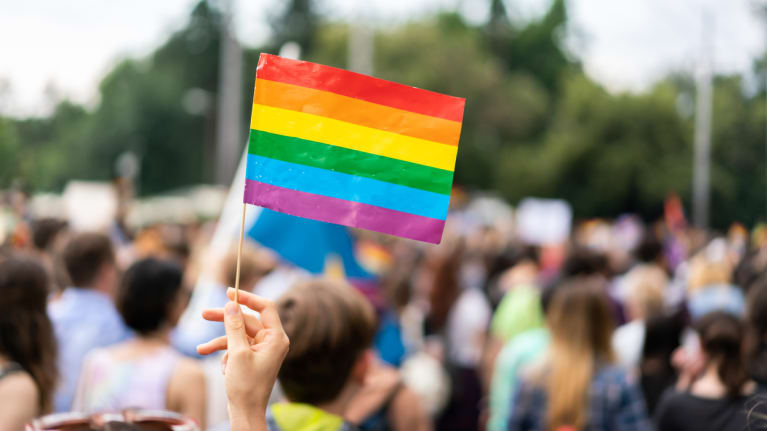More than 200 businesses signed a brief on July 2 calling on the Supreme Court to rule that Title VII of the Civil Rights Act of 1964 prohibits discrimination based on sexual orientation and gender identity. The companies represent more than 7 million employees and more than $5 trillion in revenue and include household names such as General Motors, Marriott International Inc. and The Walt Disney Company, plus several in the tech sector.
This fall, the Supreme Court will hear three cases that address the extent to which Title VII protects lesbian, gay, bisexual, transgender and queer (LGBTQ) individuals.
Patrick Brady, director, policy engagement for the Society for Human Resource Management (SHRM), said, “While many employers have already adopted inclusive anti-discrimination policies, SHRM is encouraged that the Supreme Court is scheduled to hear three cases which will provide more clarity on this important issue. At a time when both Congress and the courts are struggling with this question, having finality on the interpretation of Title VII’s protections from the Court will be helpful.”
We’ve rounded up articles from SHRM Online and other trusted news sources on the Title VII cases before the Supreme Court.
Review Granted in Three Cases
The Supreme Court has agreed to hear the cases Zarda v. Altitude Express, where the 2nd U.S. Circuit Court of Appeals held that Title VII bans sexual orientation discrimination; Bostock v. Clayton County, Ga., where the 11th Circuit held that Title VII does not ban sexual orientation discrimination; and EEOC v. R.G. & G.R. Harris Funeral Homes Inc.¸ where the 6th Circuit decided that Title VII prohibits transgender discrimination.
Equality Act
The U.S. House of Representatives passed the Equality Act on May 17, which would explicitly prohibit discrimination based on sex, sexual orientation and gender identity in employment, housing, public accommodations, education, federal funding, credit and the jury system under federal law. The Senate will now consider the bill but isn’t expected to pass it.
Business Opposition to Retraction of Transgender Rights
The July 2 brief isn’t the first time businesses have called on greater rights for LGBTQ individuals. In 2018, more than 50 companies urged the U.S. federal government to uphold protections for transgender individuals in a letter opposing actions by the Trump administration to limit those protections. The letter noted that more than 80 percent of Fortune 500 companies have gender identity protections and two-thirds have transgender-inclusive health care coverage.
State Law Prohibitions on LGBTQ Discrimination
Even if the Supreme Court declines to recognize LGBT discrimination as a form of sex discrimination under Title VII, employers must still comply with state and local laws relating to employment discrimination. “Know the laws of your city, county and state of operation and comply,” said Nonnie Shivers, an attorney with Ogletree Deakins in Phoenix. These laws can be nuanced and afford different protections. For instance, some states have created protections only for public employees. Other states and localities prohibit discrimination based on sexual orientation, gender identity or gender expression—but not all three.
Oral Arguments Scheduled
Oral arguments in the cases before the Supreme Court on the extent of Title VII’s coverage have been scheduled for Oct. 8. While the Obama administration supported treating LGBTQ discrimination claims as sex discrimination prohibited by Title VII, the Trump administration’s Justice Department has argued that the law was not intended to provide protection to gay or transgender employees.
(Fortune)
//
//(function(d, s, id){ // var js, fjs = d.getElementsByTagName(s)[0]; // if (d.getElementById(id)) {return;} // js = d.createElement(s); js.id = id; // js.src = “http://connect.facebook.net/en_US/sdk.js”; // fjs.parentNode.insertBefore(js, fjs); //}(document, ‘script’, 'facebook-jssdk’)); function shrm_encodeURI(s) { return encodeURIComponent(s); } function RightsLinkPopUp() { var url = “https://s100.copyright.com/AppDispatchServlet”; var location = url + “?publisherName=” + shrm_encodeURI(“shrm”) + “&publication=” + shrm_encodeURI(“Legal_Issues”) + “&title=” + shrm_encodeURI(“Justices Hear ERISA Reimbursement Case”) + “&publicationDate=” + shrm_encodeURI(“11/11/2015 12:00:00 AM”) + “&contentID=” + shrm_encodeURI(“6badda72-62e7-49e8-b4bd-ebbd02a72a17”) + “&charCnt=” + shrm_encodeURI(“7399”) + “&orderBeanReset=” + shrm_encodeURI(“True”); window.open(location, “RightsLink”, “location=no,toolbar=no,directories=no,status=no,menubar=no,scrollbars=yes,resizable=yes,width=650,height=550”); }
Source link
The post Companies Urge High Court to Ban LGBTQ Discrimination appeared first on consultant pro.
via Tumblr Companies Urge High Court to Ban LGBTQ Discrimination
Companies Urge High Court to Ban LGBTQ Discrimination syndicated from http://theconsultantpro.com/

No comments:
Post a Comment